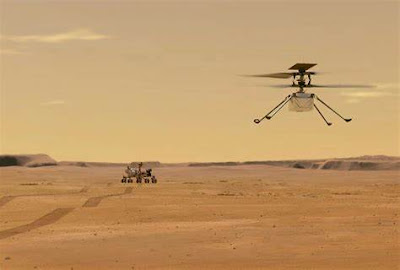NASA's Incredible Martian Weather Reports
Perseverance Rover Monitoring the Martian Weather
Source: NASA Perseverance & Ingenuity on Mars
WX Critical For Ingenuity Helicopter Flights
History continues to be made by NASA, its Perseverance Rover and Ingenuity drone helicopter on Mars. Perseverance has provided NASA with its first full weather report from Mars. Weather conditions are critical for NASA to make informed decisions on Ingenuity's schedule of flight testing. Ingenuity is the world's first helicopter to land on Mars and, for that matter, on any planet outside of the Earth. The weather data is also mission critical for making decisions on the Perseverance rover's series of missions. And the weather data tremendously expands understanding of the Martian atmosphere for NASA scientists.
Average Temperatures Far Colder Than Earth
Weather conditions are a deciding factor on when Ingenuity takes flight, which could be as early as Sunday. Perseverance's first weather report showed "clear" Martian skies, 22 mph winds and a bone chilling high temperature of minus 7.6 degrees and a low temperature of minus 117.4 degrees. That is very close to the coldest temperature ever recorded on Earth - minus 128.6 degrees in the Antarctic on 7/21/1983.
Tricky Flight Conditions
Ingenuity weighs only 4 pounds and is very vulnerable to high winds and severe cold. The harsh cold and windy conditions on Mars make helicopter flights a big challenge. Add to that, the air on Mars is incredibly thin, at barely 1% of the density of the Earth's atmosphere. Here on Earth, it is very difficult for helicopters to take off from high altitudes because of the thinness of the air. That's a big challenge, but Ingenuity has been tested in vacuum chambers to endure the conditions. Additionally, Mars' gravity is 1/3 that of the Earth. It took years for NASA to engineer Ingenuity to withstand all of these tricky flight conditions. Just the Martian cold can freeze and crack electrical components. All of the highly advanced technology in Ingenuity could be put to the test on Sunday, weather permitting.
For a comprehensive look at space explorations, go to https://read.amazon.com/kp/embed?asin=B088PX6HFD&preview=newtab&linkCode=kpe&ref_=cm_sw_r_kb_dp_AQP91PXHCGTKC62TG8R4



Comments
Post a Comment